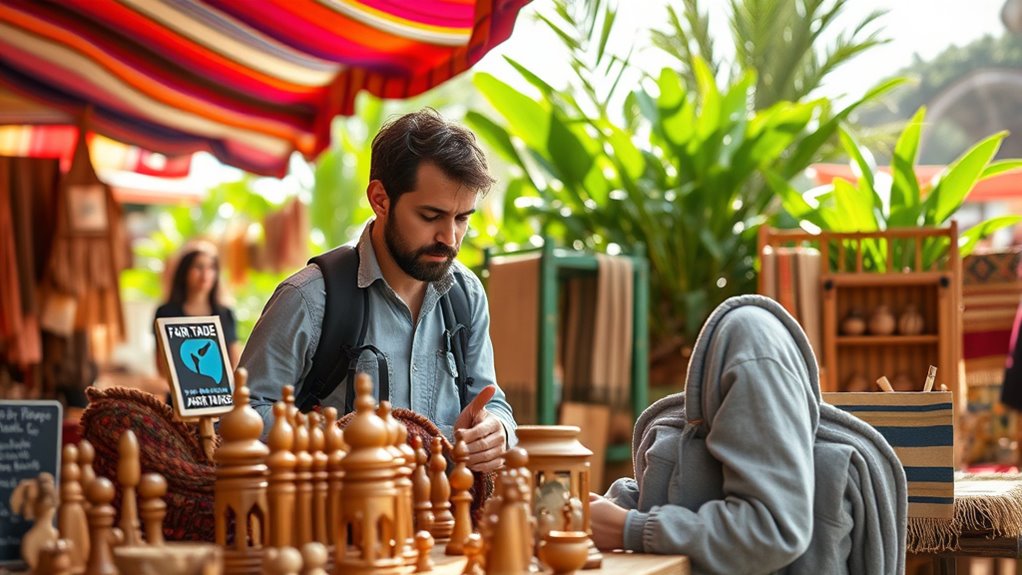To choose ethical souvenirs, focus on supporting local artisans who practice traditional craftsmanship and verify fair trade certifications to ensure fair wages. Avoid items made from endangered materials or species, and consider products that use sustainable and eco-friendly practices. Respect cultural symbols and avoid stereotypes, ensuring your purchase honors local traditions. Being aware of export laws and regulations helps you avoid legal issues. Keep these tips in mind to make responsible choices that benefit communities and the environment. There’s more to discover if you look further.
Key Takeaways
- Verify certifications like Fair Trade to ensure fair wages and ethical labor practices.
- Support local artisans and small businesses practicing traditional craftsmanship.
- Avoid items made from endangered species or with animal parts, respecting wildlife protection laws.
- Choose products made with sustainable, eco-friendly materials and minimal environmental impact.
- Research cultural significance to ensure souvenirs are authentic, respectful, and culturally appropriate.
Research the Local Craftsmanship and Artisans
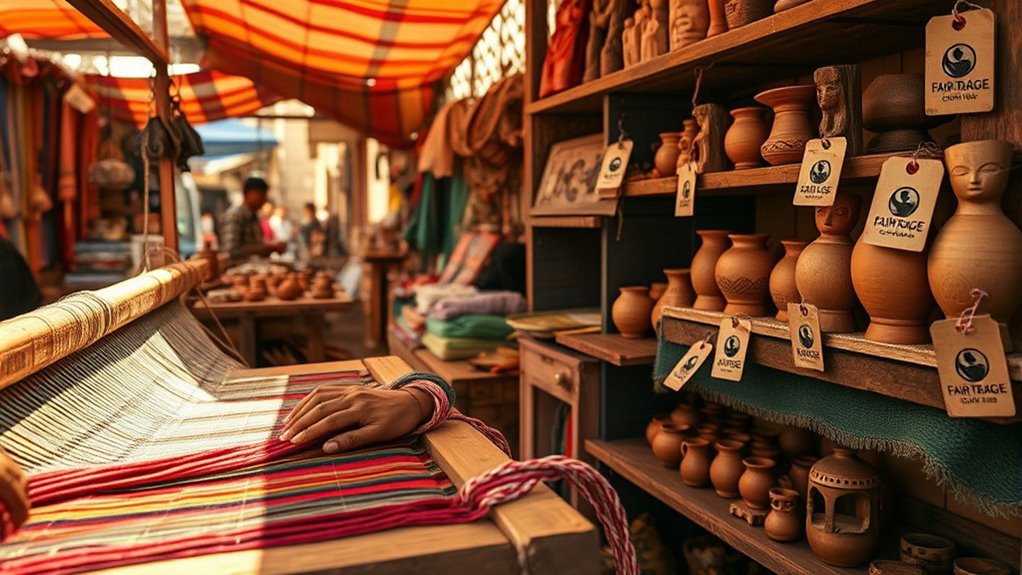
To guarantee your souvenirs are ethically sourced, start by researching the local craftsmanship and artisans behind the products. Understanding traditional craftsmanship helps you see how items are made and assure they aren’t mass-produced or imported from outside sources. Look for stories about the artisans—these give insight into their skills, community, and cultural heritage. Supporting artisans who practice authentic traditional craftsmanship helps preserve local traditions and provides fair income. Avoid buying from large vendors that may sell cheaply made, mass-produced items. Instead, seek out genuine artisan stories that highlight craftsmanship passed down through generations. By doing so, you’re not only choosing meaningful souvenirs but also helping to sustain the cultural and economic well-being of local communities. Additionally, choosing products made with best modern toilet fixtures ensures that your purchases align with sustainable and water-efficient practices.
Prioritize Fair Trade and Ethical Certifications
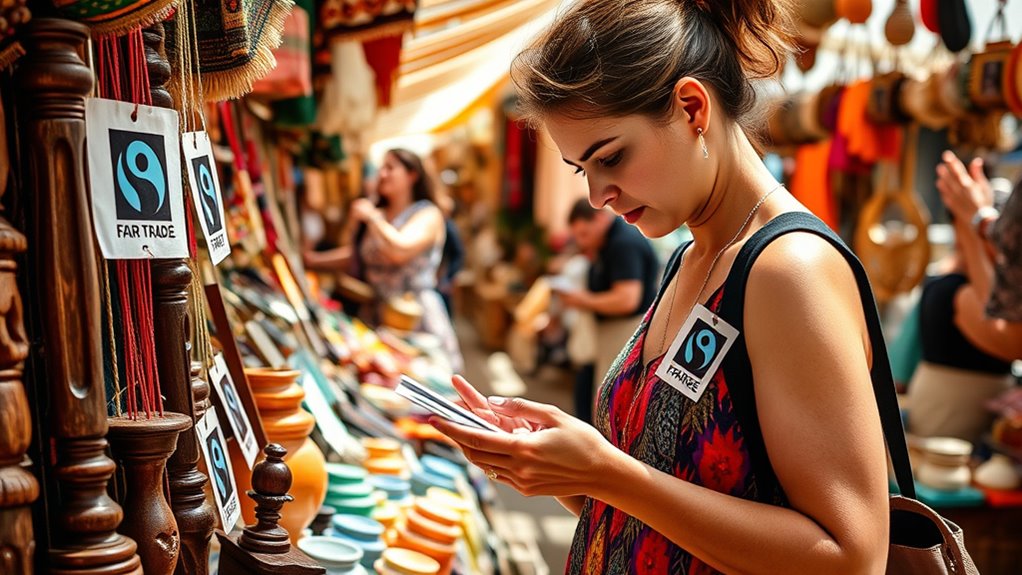
When choosing souvenirs, make certain to check certification labels to guarantee they’re legitimate. Take a moment to understand what the certification standards mean, so you can support truly fair practices. Prioritizing products with recognized fair trade labels helps you make ethical choices that benefit artisans and communities. Additionally, being aware of for sale 100 items ensures you are selecting products that are ethically sourced and responsibly produced.
Verify Certification Labels
How can you guarantee that your souvenirs are truly ethical? Start with verifying certification labels. Look closely at the tags and packaging to ensure authenticity verification. Here’s what to check:
- Confirm the label is from a reputable organization like Fair Trade International.
- Ensure the certification logo is clear and official.
- Cross-reference the certification number online for legitimacy.
- Watch for inconsistencies or signs of tampering on labels.
- Remember that quality labels contribute to the overall environmental impact of your purchase.
Understand Certification Standards
After verifying certification labels, it’s important to understand what those labels stand for by familiarizing yourself with their standards. Certification standards outline the criteria that products must meet to be considered ethically produced, ensuring fair wages, safe working conditions, and environmental sustainability. Ethical labeling provides transparency, so you can trust that the souvenirs you choose support responsible practices. Look for reputable certifications like Fair Trade, which prioritize social and environmental impacts, or other recognized ethical standards. Understanding these standards helps you make informed decisions, avoiding products that may be falsely marketed as ethical. Additionally, knowing about cybersecurity vulnerabilities can help you recognize potential risks associated with online shopping and verify the authenticity of certification information. By prioritizing certification standards, you ensure your purchase truly aligns with your values and supports sustainable, fair practices.
Support Fair Trade Practices
Supporting fair trade practices guarantees that the products you buy genuinely promote social and environmental responsibility. When you choose items with fair trade and ethical certifications, you’re endorsing fair labor conditions and ethical sourcing. Imagine:
- Farmers receiving fair wages, improving their communities
- Artisans working in safe, respectful environments
- Eco-friendly materials harvested sustainably
- Transparent supply chains that trace back to ethical sources
Ensuring the authenticity of certifications helps maintain transparency and trust in the supply chain.
Avoid Harmful or Endangered Materials
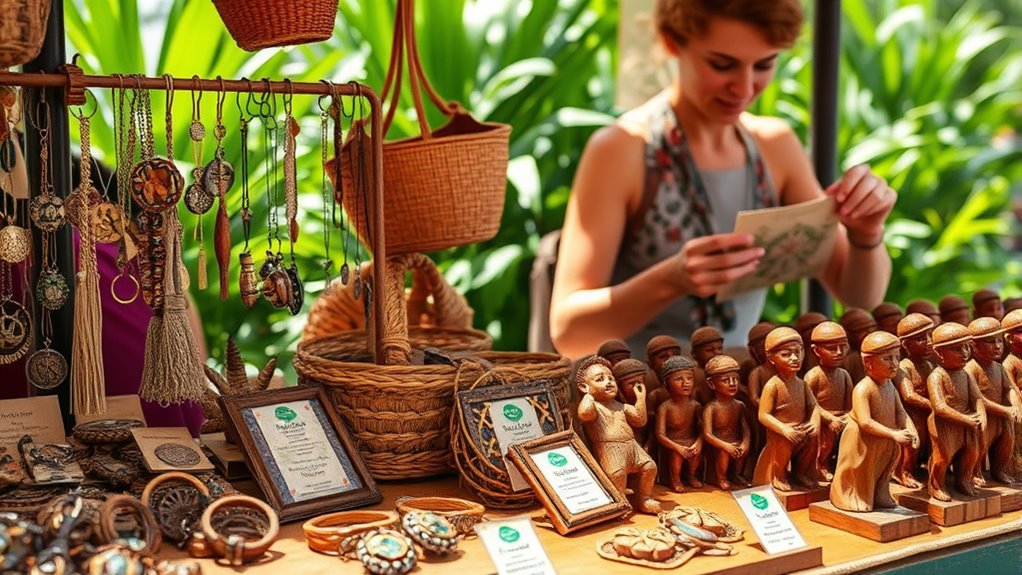
When choosing souvenirs, watch out for items made from endangered species, like certain shells or ivory. These materials often come from harmful harvesting practices that threaten wildlife. By avoiding them, you help protect vulnerable species and promote sustainable sourcing. Consider selecting items like handcrafted candles or other eco-friendly products that do not involve harmful harvesting practices.
Recognize Endangered Species
How can you guarantee your souvenir doesn’t harm endangered species? Start by recognizing signs of species protection efforts and avoiding items made from endangered wildlife. Picture these steps:
- Check labels for certifications like CITES, ensuring materials come from sustainable sources.
- Research local laws on wildlife conservation to understand what’s protected.
- Avoid items featuring animal parts, such as shells, feathers, or skins, that could be from threatened species.
- Support artisans who use eco-friendly, plant-based, or recycled materials instead of endangered wildlife products.
- Be aware of water-based products that might involve the capture of protected aquatic species.
Prevent Harmful Harvesting
To truly guarantee your souvenir doesn’t contribute to the decline of endangered species, it’s important to prevent the harvesting of harmful or protected materials. Focus on products that prioritize sustainable harvesting and ethical sourcing. Ask vendors about how their materials are obtained—prefer those who use methods that avoid damaging ecosystems or exploiting vulnerable populations. Avoid items made from endangered plants, shells, or animal parts, as these often come from illegal or unsustainable sources. Instead, seek out alternatives like recycled or locally sourced materials. By choosing souvenirs with transparent supply chains and certifications, you help support responsible practices. Preventing harmful harvesting ensures that your purchase doesn’t harm fragile ecosystems or threaten species’ survival, making your souvenir both beautiful and ethically sound. Incorporating sustainable harvesting practices into your buying decisions can further promote conservation efforts and protect biodiversity.
Support Small and Local Businesses
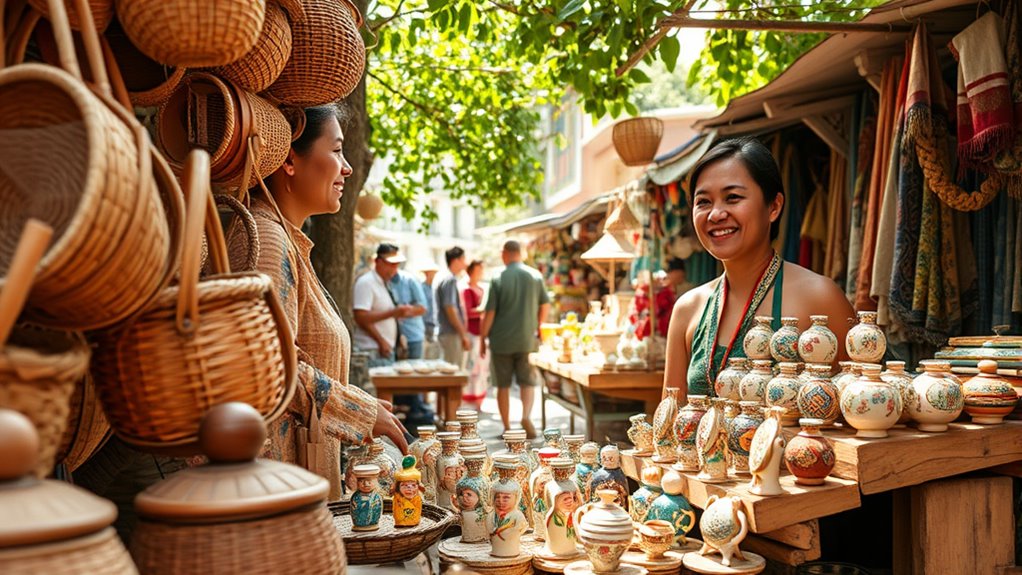
Supporting small and local businesses guarantees your souvenirs have a positive impact on the community. When you buy from a local artisan, you contribute directly to their livelihood, fostering community support. Imagine walking through a bustling market where:
Supporting local businesses enriches communities and ensures authentic, meaningful souvenirs.
- A local potter molds vibrant ceramics, reflecting the area’s culture.
- A handcrafted jewelry maker adds unique pieces to your collection.
- An artisan weaves traditional textiles with care and skill.
- A small shop owner shares stories behind each item, connecting you to the place.
- Visiting local markets offers authentic regional experiences that deepen your understanding of the community.
Be Mindful of Cultural Significance and Appropriateness
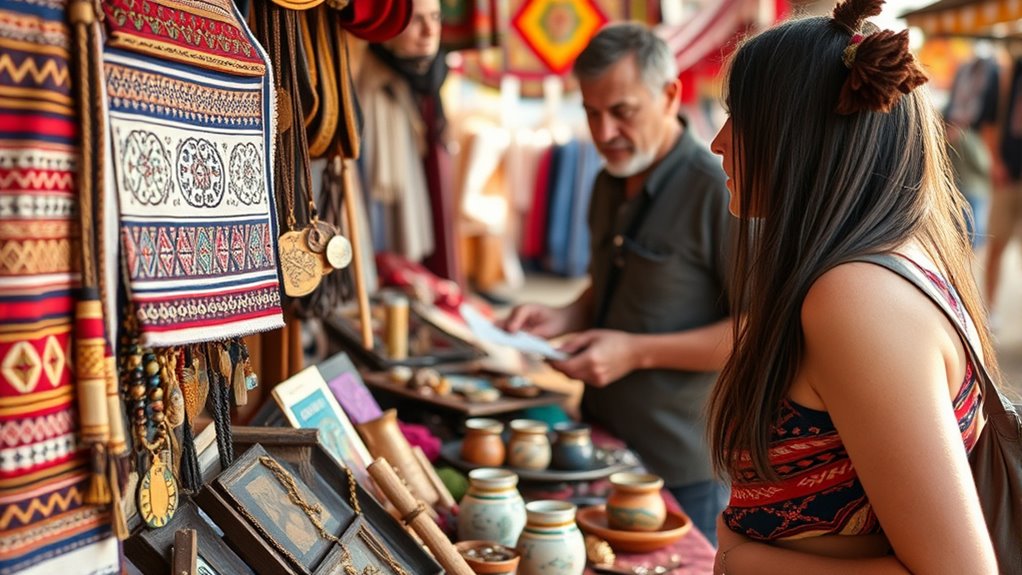
Being mindful of cultural significance and appropriateness guarantees your souvenirs honor the traditions and beliefs of the community. You should research the cultural background of the items you’re considering and avoid symbols or artifacts that could be disrespectful or misused. Showing cultural respect means understanding the meaning behind certain designs, patterns, or symbols, and ensuring they’re presented appropriately. For example, some items may have sacred or spiritual significance and should be treated with reverence. When purchasing, opt for items that are culturally authentic and properly sourced. Present these souvenirs with sensitivity, avoiding stereotypes or trivialization. Additionally, being aware of vetted sources ensures that your purchases support ethical practices and community empowerment. By doing so, you demonstrate respect for the community’s culture and help preserve its integrity, making your gift both meaningful and ethically sound.
Consider the Environmental Impact of Your Purchase
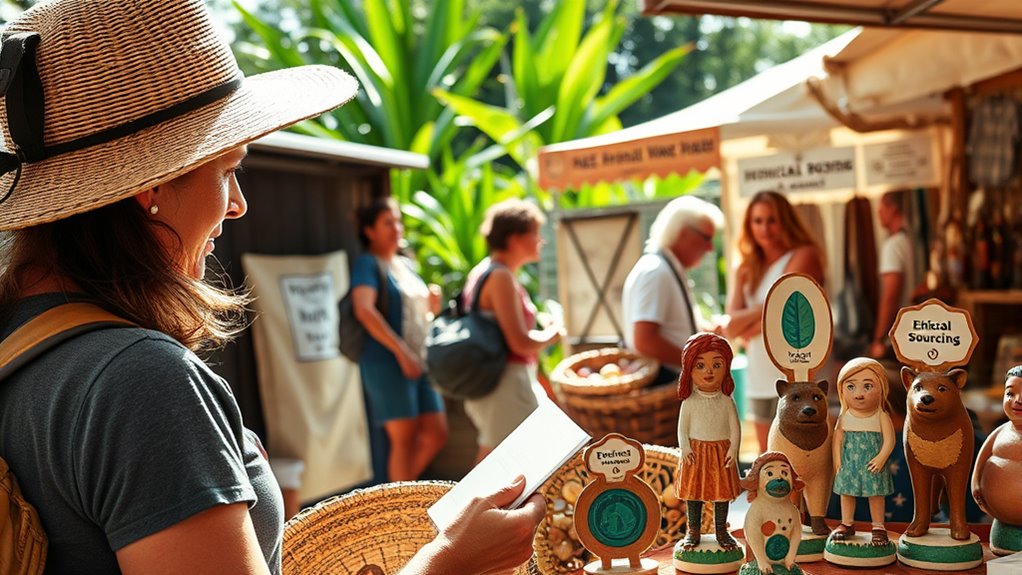
Considering the environmental impact of your purchase is essential to ensuring your souvenirs are truly ethical. Think about how your item is packaged: opt for sustainable packaging made from recycled or biodegradable materials. Next, examine if the product uses renewable resources, like bamboo or cork, instead of non-renewable materials. Visualize the production process: does it minimize waste and energy? Imagine the journey your souvenir takes: shorter transportation reduces carbon emissions. Finally, consider if the seller supports eco-friendly practices or local conservation efforts. By choosing items that prioritize sustainable packaging, renewable resources, and eco-conscious production, you help reduce environmental harm and promote a more responsible travel footprint. Your mindful choices can make a significant difference for the planet.
Educate Yourself About Export Regulations and Restrictions

Before you buy souvenirs, it’s crucial to familiarize yourself with the export regulations and restrictions of the country you’re visiting. Understanding import export laws helps ensure you don’t unknowingly violate legal restrictions that could lead to fines or confiscation. Many countries have specific rules about what can and can’t be taken out of the country, especially for items like wildlife, cultural artifacts, or handcrafted goods. Research the regulations beforehand, either through official government websites or local authorities. This knowledge helps you avoid legal issues and supports ethical purchasing. By respecting export restrictions, you contribute to preserving cultural heritage and protecting endangered species, ensuring your souvenir choices are both responsible and lawful.
Reflect on the Long-Term Benefits of Your Souvenir Choices
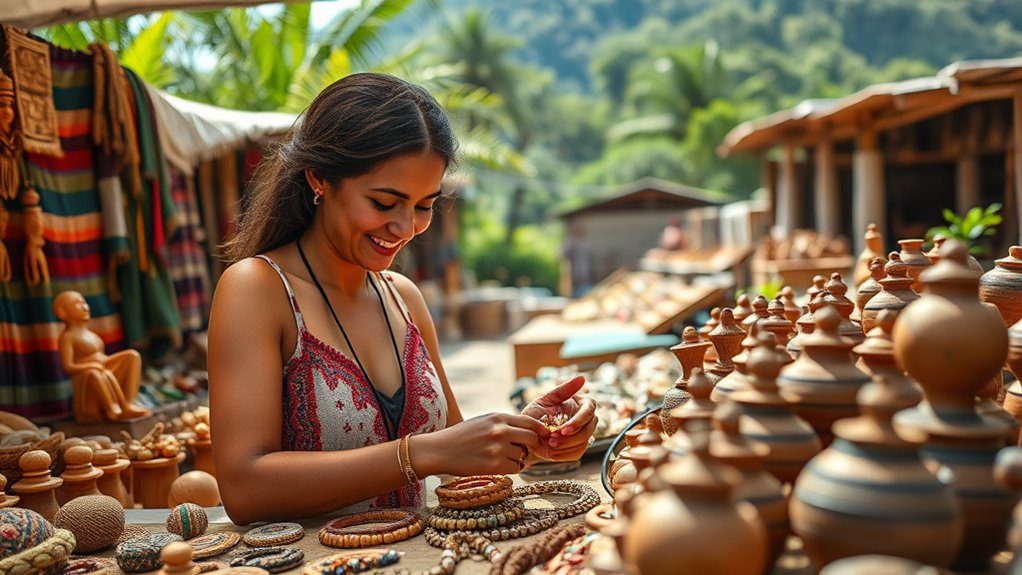
When you choose souvenirs thoughtfully, you create lasting benefits that extend beyond your immediate memory of the trip. Your decisions can support sustainable benefits and promote cultural preservation. Imagine:
- Supporting local artisans whose craftsmanship keeps traditions alive.
- Purchasing eco-friendly products that reduce environmental impact.
- Investing in items that have fair trade certification, ensuring fair wages.
- Choosing authentic artifacts that reflect the region’s heritage, helping preserve unique cultural identities.
Frequently Asked Questions
How Can I Identify Genuine Ethical Certifications on Souvenirs?
When you’re trying to identify genuine ethical certifications on souvenirs, look for clear labels like Fair Trade and Organic Labels. These certifications guarantee the products meet ethical standards, such as fair wages and sustainable practices. Always check for official logos and verify the certifying organization’s credibility. By paying attention to these details, you can confidently select souvenirs that support ethical production and make a positive impact on local communities.
What Are Common Signs of Exploitation in Souvenir Production?
You should look for signs of exploitation in souvenir production, like poor labor rights conditions, unfair pay, or child labor. Fair trade certifications often indicate ethical practices, guaranteeing fair wages and safe working environments. Avoid items with visibly cheap materials or rushed craftsmanship, as these can signal exploitation. Supporting artisans with fair trade recognition helps promote better labor rights and ensures your purchase doesn’t contribute to unethical practices.
How Do I Verify the Authenticity of Local Artisan Products?
To verify the authenticity of local artisan products, look closely at craftsmanship details like unique patterns, quality finishes, and traditional techniques. Ask the seller about sourcing transparency—where the materials come from and how the items are made. Trust reputable shops or cooperatives that openly share this information. Doing a little research beforehand helps make sure you’re supporting genuine artisans and buying ethically-made products that truly reflect local culture.
Are There Specific Questions to Ask Vendors About Ethical Practices?
Your quest for ethical souvenirs is essential, and asking vendors specific questions can make a huge difference. Inquire about their supply chain transparency, ensuring you’re not supporting hidden injustices. Ask about fair labor assurances, like fair wages and safe working conditions. Don’t be shy—these questions cut through the noise like a sword, helping you pick products that genuinely support ethical practices. Your choices can spark positive change around the world!
How Can I Tell if a Souvenir Is Culturally Respectful?
When evaluating if a souvenir is culturally respectful, you should consider whether it shows cultural sensitivity and respectful representation. Ask yourself if the item reflects authentic traditions or if it stereotypes or commodifies the culture. Research the origin and significance of the item, and choose vendors who work closely with local communities. By doing this, you guarantee your souvenir respects the culture and supports ethical practices.
Conclusion
Choosing ethical souvenirs might seem like extra effort, but it guarantees your travel leaves a positive impact. Think of walking through a market where artisans proudly craft each piece, knowing your purchase supports their livelihood. By making thoughtful choices, you help preserve cultures and protect the environment. Imagine returning home with meaningful keepsakes that tell a story of respect and care, rather than contributing to exploitation. Your mindful shopping turns souvenirs into lasting symbols of responsible travel.

